Fishing remains a favorite activity for many, blending patience, skill, and a touch of luck. However, even seasoned anglers continually look for ways to boost their catch. Surprisingly, anise oil proves to be an effective tool, acting as a natural scent that attracts fish. But why do fish like anise oil? The answer lies in its unique properties and its ability to mimic natural food cues. Accordingly, this article explores why this oil works, how to use it effectively, and tips to maximize its potential.
Table of contents
The Science Behind Fish Attraction
Fish are experts at detecting scents. Their sense of smell helps them find food, avoid predators, and communicate. Unlike humans, they can detect even the smallest chemical traces in the water. This makes scents like anise oil very effective.
Why Is Anise Oil So Appealing?
Anise oil contains anethole, a chemical with a sweet, licorice-like smell. This scent closely resembles natural food signals in the water. When fish detect this, they are drawn to investigate. The scent also spreads quickly in water, making it easier for fish to locate.
For instance, anglers targeting bass or trout often report success using anise oil. These fish are particularly responsive to aromatic baits. In saltwater environments, species like snapper and grouper also show strong reactions.
Did You Know? Anethole is not just attractive to fish. It is also used in many human products, like candies and beverages, because of its sweet aroma.
To learn more about how anise oil enhances fishing techniques, check out this helpful guide.
Ingredients and Preparation Guide
Making your own anise oil spray is simple and affordable. This DIY solution allows you to customize the mix to suit your fishing needs.
Ingredients List
| Ingredient | Amount | Notes |
|---|---|---|
| Pure Anise Oil | 10 ml | Look for high-quality extracts. |
| Carrier Oil | 100 ml | Olive or vegetable oil works. |
| Water (Optional) | 50 ml | Use for a lighter solution. |
| Glass Spray Bottle | 1 | Helps with even application. |
Step-by-Step Instructions
- Prepare Your Bottle: Clean your spray bottle to remove any old residue.
- Mix Oils: Add 10 ml of pure anise oil into the bottle. Pour in 100 ml of carrier oil to dilute it.
- Optional Dilution: If you want a lighter spray, add 50 ml of water to the mix.
- Shake to Combine: Secure the lid tightly and shake until everything blends.
- Store Properly: Keep the spray in a cool, dark place to ensure freshness.
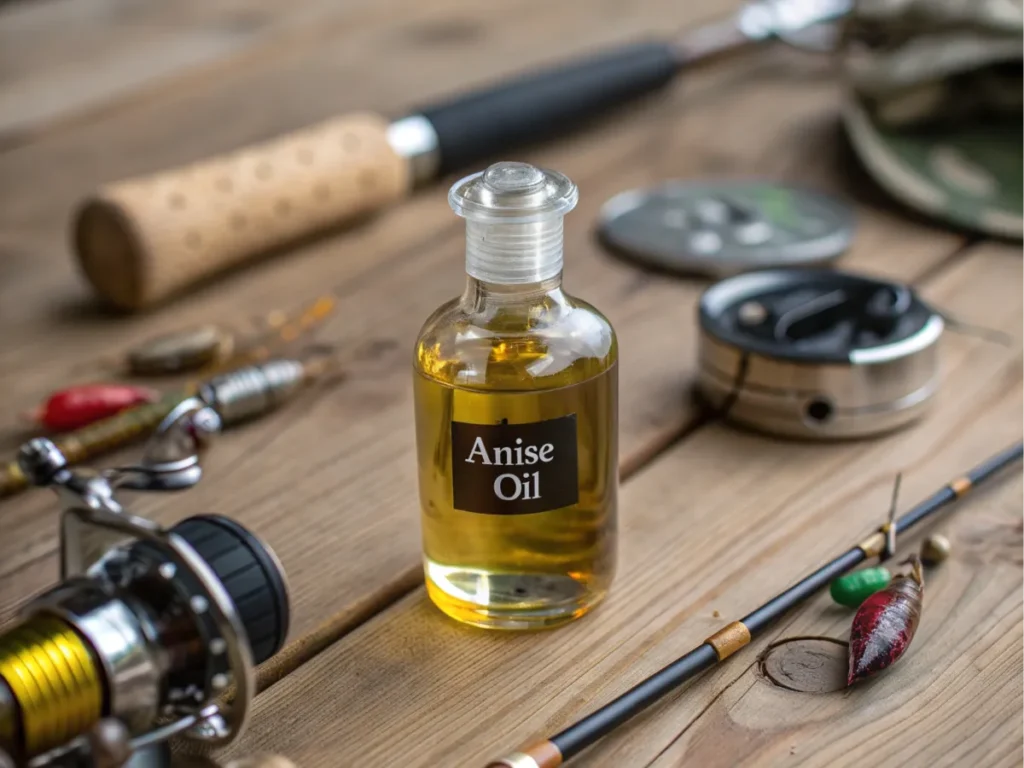
How to Use Anise Oil Effectively
Anise oil is easy to use and works well in many fishing scenarios. Whether you fish in lakes, rivers, or oceans, this scent can improve your chances of success.
Enhancing Bait and Lures
One popular way to use anise oil is by applying it to bait. Spray a small amount on soft baits like worms or dough balls before casting. This gives them a stronger scent, making them more attractive to fish. For hard lures like crankbaits, a light coating can enhance their appeal.
Pro Tip: Let the bait sit for a minute after spraying. This helps the oil stick better and last longer in the water.
If your bait is old or has lost its scent, anise oil can refresh it. A single application is often enough to make the bait more effective.
Using Anise Oil in Chumming
Chumming involves scattering small bits of bait in the water to attract fish. Adding a few drops of anise oil to the chum mix can make it even more effective. For example, mix breadcrumbs with a small amount of oil before tossing it into the water. The scent spreads, drawing fish from farther away.
This method works especially well in saltwater fishing. Fish like snapper, mackerel, and grouper respond strongly to scented chum. Combining anise oil with this technique can significantly improve your catch rate.
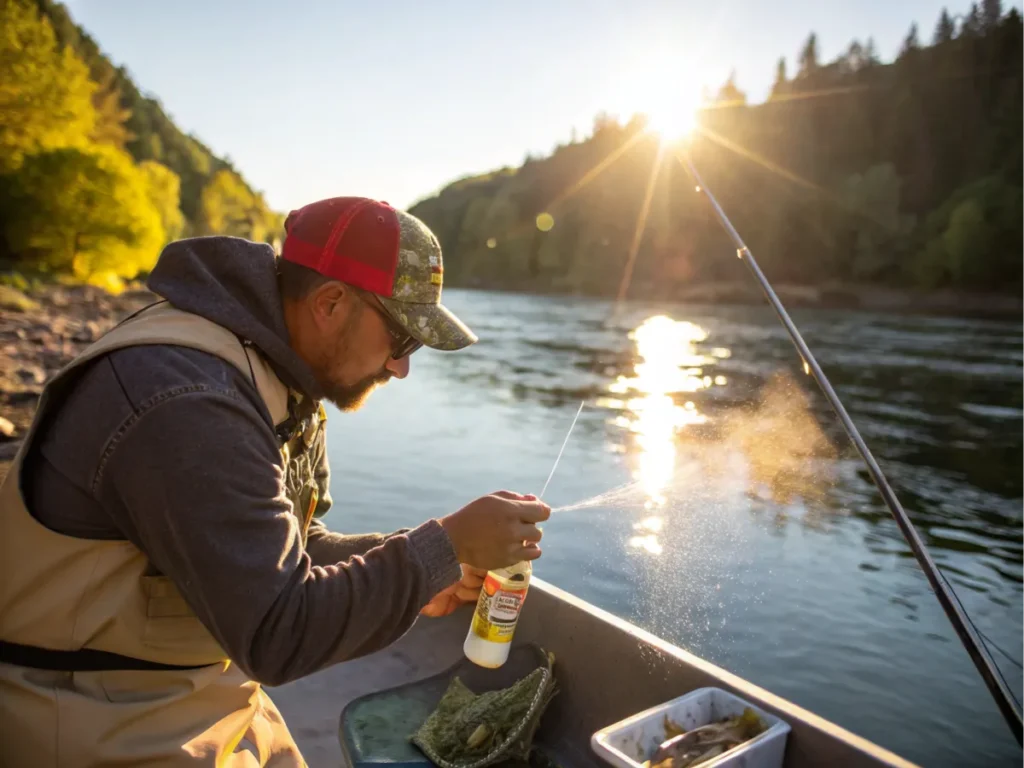
Seasonal Tips for Anise Oil Usage
The effectiveness of anise oil can depend on the season. In summer, fish are more active and respond well to strong scents. During this time, use a slightly stronger mix for better results. In colder months, fish are less aggressive. Pairing anise oil with live bait can help increase your chances of success.
Additionally, different fish species have unique responses to scents. Catfish, for example, are highly scent-driven and react strongly to anise oil. Bass, on the other hand, rely on both scent and visual cues. Understanding your target species can help you tailor your approach.
Common Mistakes to Avoid
Using anise oil is straightforward, but mistakes can limit its effectiveness. Here are some pitfalls to watch out for:
- Overusing the Oil: Too much scent can overwhelm fish. A light application works best.
- Improper Storage: Heat and sunlight can degrade the oil. Always store it in a cool, dark place.
- Uneven Application: Make sure all bait is evenly coated for consistent results.
Want more tips on using anise oil? Explore this detailed resource for additional insights.
The Benefits of Using Anise Oil
Anise oil is more than just a reliable fishing attractant—it’s a game-changer for anglers seeking effective, eco-friendly solutions. Its benefits go beyond its ability to lure fish, offering practical advantages that enhance the overall fishing experience.
Eco-Friendly and Safe
One of the most significant benefits of anise oil is its natural composition. Unlike chemical-based attractants that may harm aquatic ecosystems, anise oil is biodegradable and safe for the environment. Anglers can use it responsibly, knowing it won’t disrupt delicate habitats. This aligns perfectly with the growing trend of sustainable fishing practices.
Affordable and Long-Lasting
Fishing can be an expensive hobby, but anise oil offers a budget-friendly alternative to pricier synthetic lures and scents. A small bottle of anise oil can last through multiple fishing trips, thanks to its concentrated formula. With just a few drops needed per use, it’s an economical choice for both hobbyists and professionals.
Versatile for Different Fishing Styles
Whether you’re fishing in a serene freshwater lake or tackling the challenges of deep-sea fishing, anise oil adapts seamlessly. It works on various types of bait—live, artificial, or even chum—and attracts a wide range of fish species, including bass, catfish, and trout. This versatility makes it a valuable addition to any angler’s toolkit.
Pleasant and Easy to Use
Unlike some attractants with harsh or unpleasant odors, anise oil has a sweet, licorice-like aroma that many anglers find enjoyable. This makes handling bait a more pleasant experience, especially during longer fishing trips. Additionally, its ease of application—whether sprayed, dipped, or mixed—ensures that anglers of all skill levels can use it effectively.
A Practical Choice
Anise oil’s longevity and adaptability make it a practical tool for anglers who want reliable results without constant reapplication. Its scent remains potent even after being stored for extended periods, provided it is kept in a cool, dry place. This makes it an excellent choice for fishing trips of any duration.
By combining affordability, sustainability, and effectiveness, anise oil has cemented its place as a favorite among anglers. Whether you’re looking for a natural way to attract fish or seeking an eco-conscious alternative to synthetic options, anise oil delivers on every front.
Dynamic Uses of Anise Oil for Fishing
Anise oil is a powerful attractant that works in various fishing conditions. It offers flexibility, allowing anglers to tailor its use for specific needs. Whether you are fishing in clear streams or deep waters, anise oil can enhance your success.
Customizing Anise Oil Applications
Mixing anise oil with other natural scents can amplify its effectiveness. For example, combining it with garlic or shrimp extract creates a potent blend that attracts scent-driven fish. Anglers targeting species like catfish and carp often rely on these mixtures.
You can also use anise oil to mask human odors. Rubbing a drop of diluted oil on your hands before handling bait prevents the transfer of unnatural scents. This is especially helpful when fishing in highly competitive areas where fish may be cautious.
For insights into how anise oil complements other natural attractants, explore this guide on aromatic properties.
Pro Tip: Use anise oil with live bait in colder months when fish are less active. The added scent can encourage bites from even the most sluggish fish.
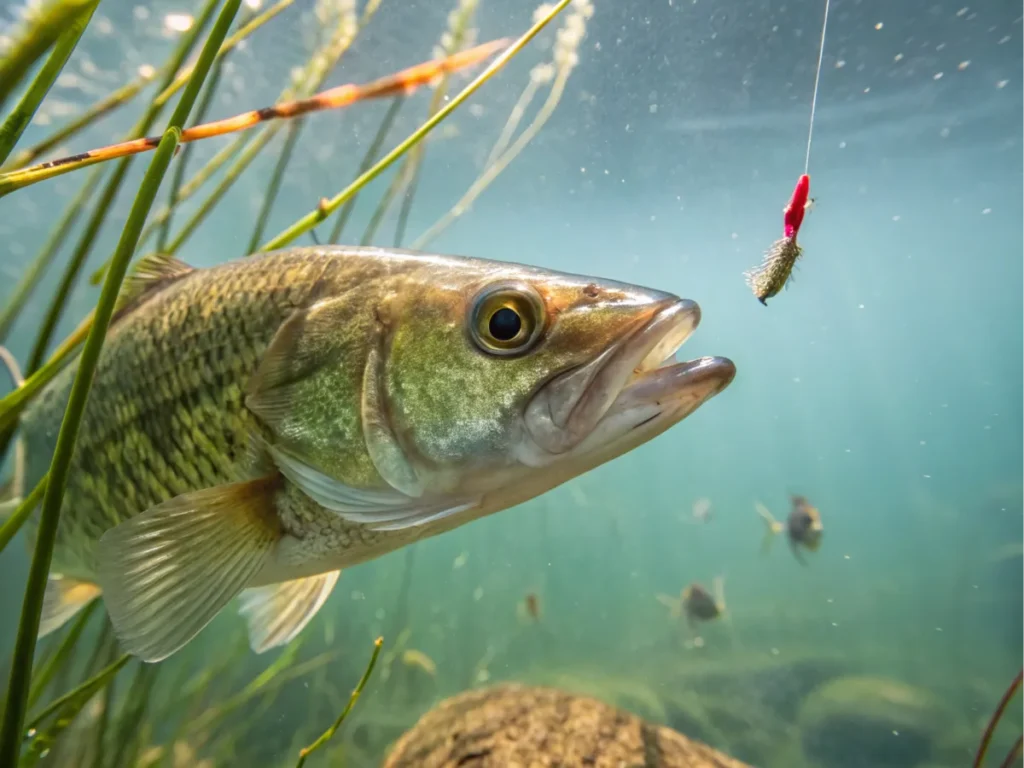
Expert Techniques for Anise Oil Success
While anise oil is simple to use, advanced techniques can maximize its effectiveness. Timing, placement, and reapplication are crucial factors to consider.
Creating Effective Scent Trails
Fish rely heavily on scent to locate food. Applying anise oil to bait or chum in moving water allows the scent to travel further, creating a clear trail for fish to follow. In stagnant water, spraying the oil around your fishing spot can help spread the aroma.
Reapplying the oil after every few casts is also essential. This keeps the scent fresh and ensures that fish remain interested. Adding the oil directly to fishing line or hooks can further enhance its appeal.

Using Anise Oil for Artificial Lures
Anise oil works wonders on artificial lures. Soft plastics, crankbaits, and jigs can all benefit from a light coating of the oil. This makes the lures more enticing by mimicking the scent of natural prey. Tournament anglers often use this trick to gain an edge in competitive fishing events.
Some anglers also apply anise oil to non-traditional tools, such as flies used in fly fishing. A small dab of the oil can make these lures irresistible to trout and other scent-driven fish.
FAQs About Anise Oil
What Does Anise Do to Fish?
Anise oil stimulates a fish’s olfactory senses, triggering their instinct to feed. The sweet, licorice-like scent mimics natural food signals, making fish curious and more likely to bite.
What Essential Oil Attracts Fish?
Anise oil is one of the most effective essential oils for attracting fish. Its strong aroma appeals to a wide range of species, including bass, trout, and catfish.
What Scent Are Fish Most Attracted To?
Fish are naturally drawn to scents that resemble their diet. Anise oil stands out because it mimics these natural aromas, making it a favorite among anglers. Other effective scents include garlic and shrimp extracts.
What Is the Fish Oil with Aniseed?
Fish oils infused with anise oil combine the benefits of both attractants. These blends are particularly effective for targeting scent-driven fish, such as carp and catfish.
Pro Tips and Seasonal Adjustments
Getting the most out of anise oil often involves adapting your techniques based on fishing conditions. These tips can help you use this attractant more effectively while staying organized and prepared.
- Seasonal Strategies: Fish behave differently depending on the time of year. During summer, use a stronger, undiluted anise oil spray to maximize scent trails. In colder months, combining anise oil with live bait can entice sluggish fish to bite.
- Storage Solutions: Proper storage of your fishing gear and additives is crucial for maintaining their effectiveness. For instance, keeping anise oil in a sealed, waterproof pouch prevents leaks and ensures the oil stays fresh for extended trips. Using similar strategies for other ingredients, like how dairy-based additions enhance recipes, as explored here, ensures you are prepared for every fishing scenario.
- Experimentation: Don’t hesitate to try new approaches. Add anise oil to different types of bait or chum and observe what works best for your target species. Sometimes, unexpected combinations can yield surprising results.
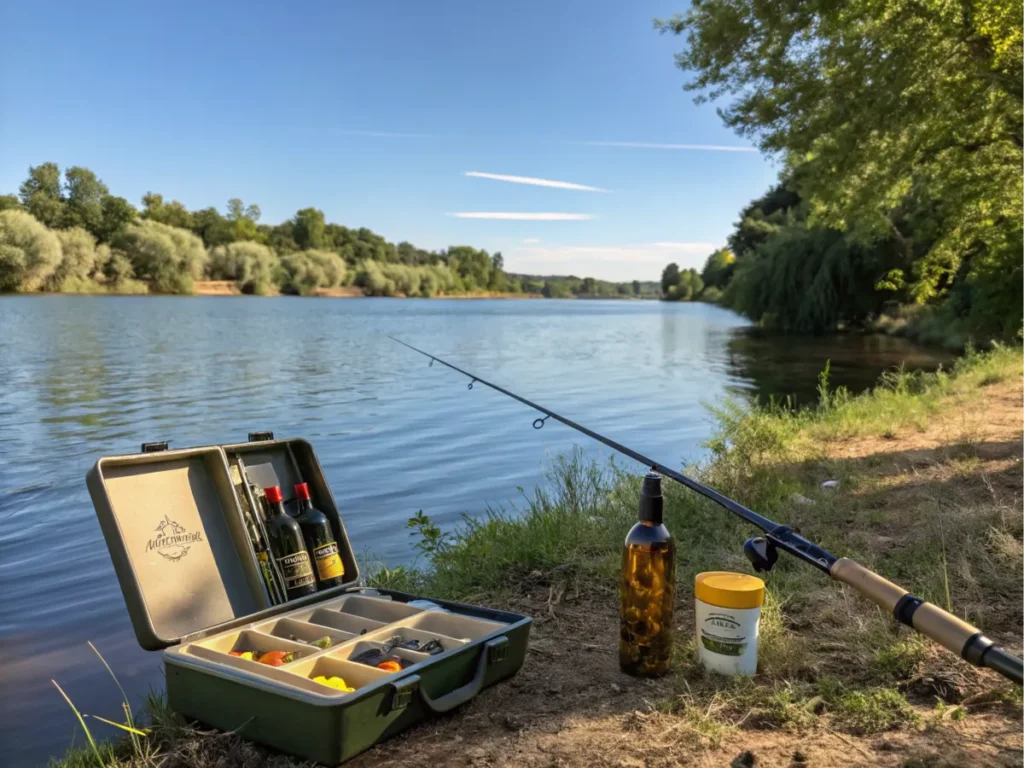
Conclusion
Anise oil serves as a game-changing tool for anglers. Additionally, its ability to mimic natural food scents makes it highly effective in attracting fish. With its versatility and ease of use, this natural attractant becomes a must-have for every angler’s kit.
By applying the tips and techniques outlined in this guide, you can enhance your fishing success. Whether you’re targeting bass, trout, or catfish, anise oil offers a reliable and eco-friendly solution. Start incorporating it into your fishing routine today and experience the difference it can make.

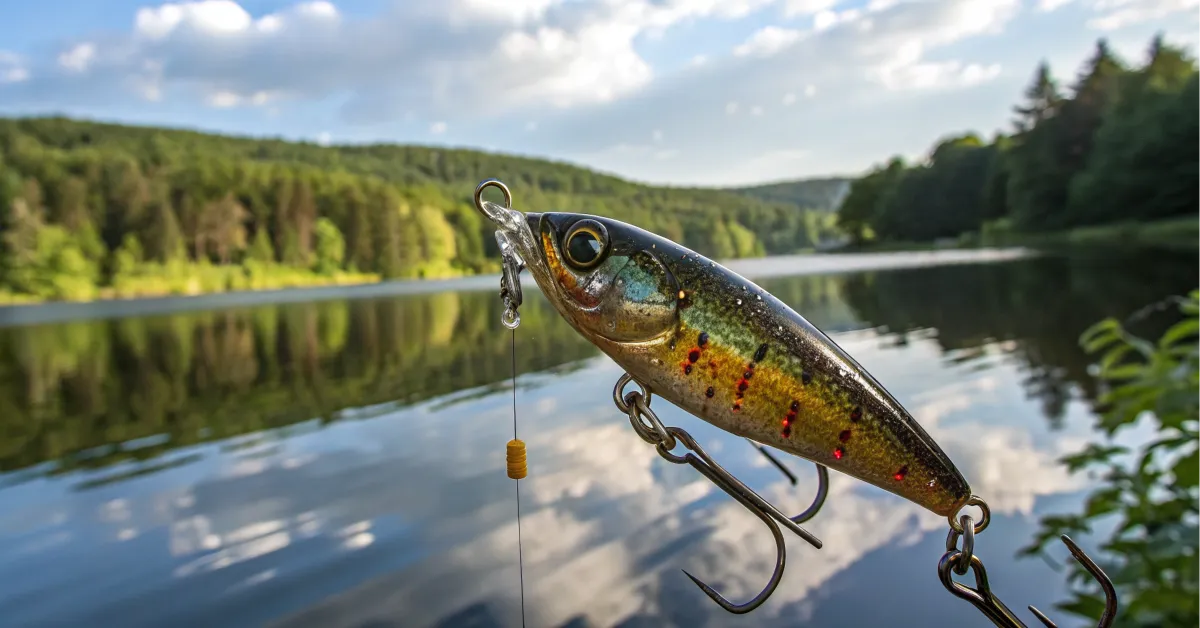
1 thought on “Why Do Fish Like Anise Oil? Discover Its Fascinating Effects”